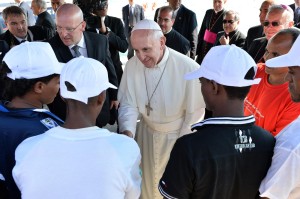Pope Francis this week made his first pastoral visit outside of Rome since his election in March by visiting Lampedusa, a tiny fishing island lying between Italy and North Africa which is one of the first gateways into Europe for thousands of African immigrants fleeing poverty and conflict.
The choice of Lampedusa, which lies about 80 miles from Tunisia, for his first official trip was a symbolic one for the bishop of Rome, who has often emphasised his concern for the world’s most needy and has already been styled “the pope for the poor.”
Francis arrived at the port onboard a coastguard vessel accompanied by a flotilla of fishing boats. Thousands of islanders welcomed the pope, who threw a wreath in the sea as he came ashore, in memory of the many people who have drowned trying to reach Europe.
“You’re one of us,” read one banner hanging at the port.
Tens of thousands of migrants have made the dangerous crossing in recent years, usually packed into rickety wooden fishing boats and at the mercy of the elements.
The Pope said that news reports of the deaths at sea of those crossing from North Africa have been like “a thorn in the heart.”
Upon arrival, he spoke to a number of young African migrants before celebrating mass in a playing field that served as a reception centre for the tens of thousands of mainly Muslim migrants who fled the turmoil of 2011’s North African “Arab Spring”, greatly increasing an influx that had already gone on for years.
In his homily he saluted the migrants, many of whom are preparing to commence their Ramadan fast, and thanked the native islanders for taking them in and setting an example of solidarity to what he called a selfish society sliding into “the globalisation of indifference.”
“We have lost a sense of brotherly responsibility,” he said, and “have forgotten how to cry” for migrants lost at sea.
“Who has wept for the people who were on the boat? For the young mothers carrying their babies? For these men who wanted something to support their families?” he asked.
“We are a society that has forgotten the experience of weeping, of “suffering with”: the globalization of indifference has taken from us the ability to weep!”
He continued: “The culture of well-being, that makes us think of ourselves, that makes us insensitive to the cries of others, that makes us live in soap bubbles, that are beautiful but are nothing, are illusions of futility, of the transient, that brings indifference to others, that brings even the globalization of indifference. In this world of globalisation we have fallen into a globalisation of indifference. We are accustomed to the suffering of others, it doesn’t concern us, it’s none of our business.”
During the open-air mass he used a painted fishing boat as an altar and a wooden chalice carved from the wood of a migrant vessel by a local carpenter.
He denounced the traffickers as “people for whom the poverty of others is a source of income”, as well as asking for pardon for “those, whose decisions at a global level have created the conditions which have led us to this drama.”
Francis, who was born Jorge Mario Bergoglio, is himself the son of an immigrant accountant, who fled from Italy to Argentina with the rise of the Fascist regime in his homeland.
Just a few hours before the Pope arrived, a boat carrying 165 migrants – according to some reports from Mali, according to others from Eritrea – docked into port, while the day before, 120 people, including four pregnant women, were rescued at sea after the motors in their boat broke down 7 miles off the coast.
According to figures from the United Nations, 8,400 migrants and asylum seekers landed in Italy and nearby Malta in the first half of the year, the vast majority of them from North Africa. That figure is almost twice as many as last year, but down on 2011’s peak.
In that year, when over 62,000 arrived in Italy, dozens of boats carrying hundreds and sometimes thousands of people were arriving in Lampedusa each and every day.
So far, the UN said 40 people were known to have died crossing from Tunisia to Italy this year, dramatically less than in 2012 when almost 500 were reported dead or missing. The improvement is the result of better coordination between Italy and Malta.
Francis’ address may well pose a problem for the Italian right, whose actions towards immigrants have often been less than accommodating. Though forthright in their proclamations of respect for Catholic teaching, the followers of former PM Silvio Berlusconi and the Northern League backed a deal with the late Libyan leader Colonel Muammar Gaddafi that involved repelling seaborne migrants before they had a chance to apply for asylum.
Meanwhile the 5,000 islanders of Lampedusa, who are sometimes outnumbered by the numbers of immigrants waiting to be transferred to Sicily and mainland Italy, have seen their quiet home transformed into a refugee centre, with improvised campsites sprawling across the hills above the port. Yet in spite of this they have largely welcomed the migrants with generosity and tolerance and there have been few reports of tensions or problems.
Most of the islanders’ protests have been directed at the authorities’ failure to provide them with sufficient resources.











